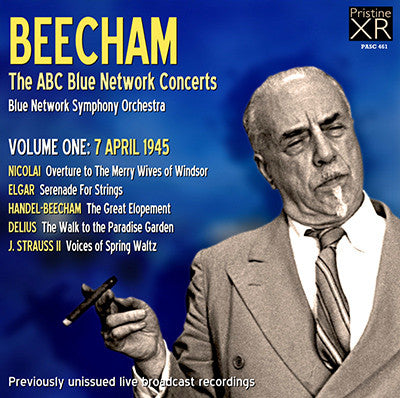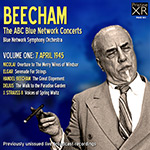
This album is included in the following sets:
This set contains the following albums:
- Producer's Note
- Full Track Listing
- Cover Art
- Additional Notes
First of four newly-discovered broadcast concerts by Beecham at the nascent ABC in 1945
"Robust and joyous ... a wonderfully entertaining album" - Fanfare
As indicated in our additional notes here, ABC, the American Broadcasting Company, had a somewhat unusual and protracted birth. The company and, in particular, its radio network, were still in a state of transition when, in April 1945, it acquired the services of Sir Thomas Beecham to conduct a series of four concerts with a little-known orchestra billed on air as the "Blue Network Symphony Orchestra", and more prosaically in the New York Times radio listings as simply "Sir Thomas Beecham, conducting a Symphonic Orchestra".
Quite from where the members of this orchestra were drawn is open to some guesswork: the members of the New York Philharmonic were engaged on the morning of the first broadcast in an 11am youth concert at Carnegie Hall - could some of these players also have made it to the 4pm live broadcast for ABC? Toscanini had no engagements with his NBC Symphony Orchestra that month - might some of them moonlighted on the very same Blue Network which had traditionally been their home when it was under the NBC umbrella? Beecham, meanwhile, was in New York to conduct the Rochester Orchestra in two concerts at Carnegie Hall in March and a third (a ballet) on 6th April 1945, at the Met. Might he have run through with them the twenty various shorter items which made up these four broadcasts? And would the players go on to form the same "ABC Symphony Orchestra" that composer Roy Harris conducted in his own music three years later? Maybe answers will be unearthed as this series continues.
And it's certainly an interesting collection of music, including "radio premières" of music credited to Handel-Beecham, one of which features the then Lady Beecham, Betty Humby, on piano. Of particular historic interest is the second in the series, which was hastily converted into a memorial concert for the late President Franklin D. Roosevelt, whose funeral service was taking place at the White House as the broadcast proceeded, something which entailed leaving the Unfinished Symphony literally unfinished as the station cut to a live commentator on the event.
Sonically the recordings are more than adequate for AM radio broadcasts of the era, if largely lacking in the upper frequencies one might wish for in a hi-fi recording. They were preserved on 33rpm acetate discs from which these restorations were drawn.
Andrew Rose
NICOLAI The Merry Wives of Windsor - Overture
ELGAR Serenade for Strings in E minor, Op. 20
HANDEL-BEECHAM The Great Elopement - Selections
DELIUS The Walk to the Paradise Garden
J STRAUSS II Frühlingsstimmen (Voices of Spring Waltz) Op. 410
Live broadcast on ABC/Blue Network, 4pm, 7 April 1945
Announcer: Milton Cross
Blue Network Symphony Orchestra
Sir Thomas Beecham, conductor
NBC expanded so rapidly that by 1927 it found itself with an excess of
affiliates in the same cities, so it split its programming into two
separate networks, called the Red and the Blue networks. After the
Federal Communications Commission (FCC) declared in 1941 that no company
could own more than one radio network, NBC in 1943 sold the
less-lucrative Blue Network to Edward J. Noble, the millionaire maker of
Life Savers candy, who initially renamed it the American Broadcasting
System before settling on the name the American Broadcasting Company,
Inc. (ABC). ABC was the smallest of the major radio networks and
distinguished itself by hiring popular singer Bing Crosby to perform on a
weekly variety series. As a precondition for his employment, Crosby
required that he be allowed to prerecord the program for later
broadcast; as a result, ABC became a pioneer in the field of magnetic
recording.
Encyclopaedia Britannica notes on the birth of the American Broadcasting Company
A
major priority of the Blue Network was to form a new identity, one that
would mark a break with the past. In December, 1945 [sic], the FCC
approved the transfer of The Blue Network, Inc.'s broadcast licenses to
American Broadcasting Company. Beginning on January 22, 1945, the
network's opening and closing announcements changed to "The Blue Network
of the American Broadcasting Company"; starting February 18, the same
wording was instituted as the network outcue for station breaks. On June
15, 1945, the Blue Network formally changed its name to the American
Broadcasting Company. They were not alone in desiring this catchy
acronym. Two prior claimants were bought out prior to June 1945, and in
negotiations with the Associated Broadcasting Corp. in December 1945, it
acquired the rights to the name "ABC" from yet a third party. From June
1945 forward, the entity has been known generally as the American
Broadcasting Company.
Wikipedia notes on the birth of the American Broadcasting Company
Fanfare Review
Delius’s The Walk to the Paradise Garden erupts with considerably more heart-on-sleeve pathos than in the conductor’s commercial recording
During the Second World War Thomas Beecham made few friends in Britain by spending its four most dangerous years living abroad. He sailed for Australia in the spring of 1940, then moved to the United States. He became the music director of the then distinctly low-powered Seattle Symphony in 1941, joining the staff of the Metropolitan Opera in the following year. In all, the peripatetic Bart conducted nearly 20 orchestras during his stay in the New World, including the orchestra of NBC’s Blue Network, which thanks to an FCC ruling declaring that no single entity could own more than one radio network eventually became the American Broadcasting Company—today’s ABC. In New York for concerts with the Rochester Philharmonic during the first week of April 1945, Beecham conducted a Blue Network afternoon broadcast on April 7, and this is the result.
The sparkling performance of The Merry Wives of Windsor Overture with which the program began illuminates one of the central truths of Beecham’s career: Namely, that in spite of one of the most eccentric stick techniques in the history of conducting—to say nothing of a rehearsal technique that was even more mysterious—Beecham had the uncanny ability to make any orchestra sound better than it was. (A few years earlier he conducted a series of near-legendary concerts with the New York City Symphony, an orchestra made up of unemployed musicians organized as a pet project of the music-loving Mayor Fiorello La Guardia with funds from the WPA.) Possibly made up of members of the New York Philharmonic, NBC Symphony, and various freelancers—its actual composition at this stage remains a mystery—the Blue Network Symphony had at most a couple of rehearsals prior to the broadcast, and yet from the opening bars play like men possessed. The opening radiates the unique Beecham mischievousness and wit—could anyone make woodwinds chirp as delightfully as he did?—while the Overture’s big tune sings with the kind of soaring grace befitting one of the great opera conductors of his time.
Billed as the “radio premiere” of The Great Elopement, Beecham’s pick-up band plays this delightful confection—including the celebrated hornpipe which quotes Thomas Augustin Arne’s Rule, Britannia—as though it had been in their collective repertoire for years, while Delius’s The Walk to the Paradise Garden—another Beecham house specialty—erupts with considerably more heart-on-sleeve pathos than in the conductor’s commercial recording. Alas, the mid-1940s aircheck sound breaks up badly in the climaxes. If Beecham’s version of Frühlingsstimmen is not exactly echt-Viennese—Tales from St. John’s Wood would be a closer approximation—then it’s nonetheless suitably robust and joyous and brings a wonderfully entertaining album to a close. The incomparable Milton Cross’s spoken contributions only further enhance the period charm.
Jim Svejda
This article originally appeared in Issue 39:6 (July/Aug 2016) of Fanfare Magazine.

